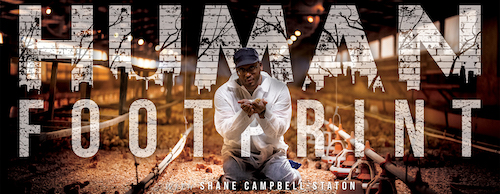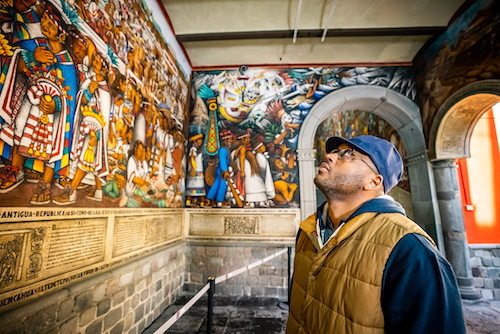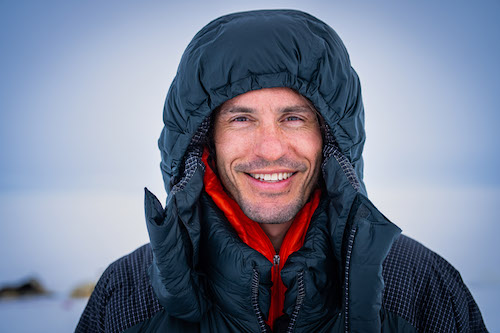Communiqué
A single species dominating and transforming the planet in “HUMAN FOOTPRINT” starting July 5 at 9 pm
< < Back toNew Six-Part Documentary Series HUMAN FOOTPRINT Examines How Humans Have Transformed the Planet
Hosted by Biologist Shane Campbell-Staton and Produced by Day’s Edge Productions, the Series Airs on PBS
Wednesdays, July 5 – August 9 at 9 p.m.
HUMAN FOOTPRINT, a new six-part science documentary, premieres Wednesdays, July 5 – August 9, at 9 p.m. on PBS, PBS.org and the PBS App. Hosted by biologist and Princeton University professor Shane Campbell-Staton, Ph.D., this part-science, part-travel series takes viewers from high-tech labs to sweltering street markets, from farms to restaurants, and from primeval forests to the back alleys of New York to explore the ways humans are transforming the planet – and what those transformations tell us about who we are as a species. HUMAN FOOTPRINT is a visually stunning series set to an original score by legendary hip-hop and jazz producer Adrian Younge.
 “HUMAN FOOTPRINT is a modern and exciting addition to our growing slate of climate and environmental programming that will energize all audiences to engage in exploring the science that’s all around us,” said Bill Gardner, Vice President, Multiplatform Programming & Head of Development at PBS. “We’re proud to welcome Shane and HUMAN FOOTPRINT to our legacy of best-in-class, provocative science content that’s also relatable, relevant, and a joy to watch.”
“HUMAN FOOTPRINT is a modern and exciting addition to our growing slate of climate and environmental programming that will energize all audiences to engage in exploring the science that’s all around us,” said Bill Gardner, Vice President, Multiplatform Programming & Head of Development at PBS. “We’re proud to welcome Shane and HUMAN FOOTPRINT to our legacy of best-in-class, provocative science content that’s also relatable, relevant, and a joy to watch.”
In 4.5 billion years, the planet has never experienced anything like humans; we are no ordinary organism. Even our most basic needs — food, water, and shelter — place a staggering burden on the planet’s resources. Through unique interactions with an eclectic cast of characters – from scientists and historians to rat exterminators and dog dancing gurus – Shane discovers the complex motivations behind our impacts and unveils opportunities for a less lopsided coexistence.
“Hosting HUMAN FOOTPRINT has been one of the greatest adventures of my life. I study how animals adapt to the changes we are making to the planet, but this journey really helped me to better understand the depth and breadth of our impact,” Shane said. “We are so intricately connected to the world around us in so many ways. I hope this series helps others to see and think about those connections in new ways.”
Each episode of HUMAN FOOTPRINT is built on a foundation of science, but the biggest lessons are about human nature. The series is not a “doom and gloom” tale of human villainy. Instead, it is an honest reckoning with our vast footprint and our species’ singular history of transforming the planet. The series’ six episodes cover a wide range of topics: invasive species that are both deeply devastating to ecosystems and critical components of culture; how it came to pass that once-wild wolves now work, sleep, and dance (that’s right, dance) alongside us; how five species that met our needs have hitched a ride along with us to global domination; the way that modern cities are both deadly and delightful for their inhabitants; and the science and history behind a crop with an outsized impact on culture – cotton.

“We’re thrilled to share HUMAN FOOTPRINT and Dr. Shane Campbell-Staton with audiences around the world,” said Neil Losin, owner and senior producer at Day’s Edge. “Now is the time to ask the big questions about humanity’s past, present and future, and Shane’s knowledge, curiosity and humility make him the perfect guide for this unforgettable journey.”
Descriptions and broadcast dates for each of the six episodes:
“Strangers in Paradise”
Premieres Wednesday, July 5, at 9 p.m. ET
Invasive species are reshaping the world’s ecosystems, but who’s to blame? Shane wrestles a python, hunts a wild pig, and gets sucker-punched by a carp to answer the question: in the age of humans, how does our species decide what belongs?
“Top Predator”
Premieres Wednesday, July 12, at 9 p.m. ET
There is a killer inside us. Our biology, culture, technology, and economy have transformed our species into the world’s greatest predator. From Yellowstone to Mozambique, Shane explores our global impact as the planet’s Top Predator.
“Man’s Best Friend”
Premieres Wednesday, July 19, at 9 p.m. ET
Shane discovers why dogs are more than “Man’s Best Friend” – they have been reshaped by evolution into humans’ perfect partner. And just as we’ve transformed them, dogs have left an unmistakable pawprint on us – and the world we share.

“The Replacements”
Premieres Wednesday, July 26 at 9 p.m. ET
Shane explores the surprising science and unexpected histories of “The Replacements:” five animal and plant species that made allies of humans, grew to dominate the planet alongside us, and changed their destinies (and ours) forever.
“The Urban Jungle”
Premieres Wednesday, August 2, at 9 p.m. ET
In “The Urban Jungle,” Shane explores the modern city: an ecosystem built by and for us. He encounters three species thriving in the city, reckons with our complex urban history, and envisions a new and wilder urban future.
“The Ground Below”
Premieres Wednesday, August 9 at 9 p.m. ET
In an episode that hits close to home, Shane explores the history and science of cotton. A prehistoric coastline from North Carolina to Texas laid the foundation for a crop that re-shaped our history, our culture, and even our DNA.
HUMAN FOOTPRINT is produced by Day’s Edge Productions with Nate Dappen, Ph.D., and Neil Losin, Ph.D., as series producers and directors. Bill Gardner is executive in charge for PBS. HUMAN FOOTPRINT has been made possible in part through funding secured from Margaret A. Cargill Philanthropies.
In addition to the broadcast, there will be an eight-part digital companion web series also titled HUMAN FOOTPRINT. Launching in July, the digital series and expands upon many stories featured throughout the broadcast with additional original scripted content, animations and new behind the scenes footage from Shane. The series will be released on PBS Terra, the home for PBS’s science and nature programming on YouTube.
This programming is part of a multiyear, multiplatform initiative from PBS that explores every aspect of how climate change impacts communities, countries and the entire planet. The comprehensive focus represents PBS’s biggest-ever commitment to the topic, providing a deeper understanding of the issues surrounding climate change and exploring its intersections with conservation, biodiversity and the ecosystem. PBS and its member stations will create a rich destination of storytelling that details the challenges of a changing climate while highlighting examples of hope and positive impact.

